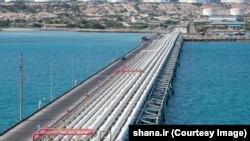The United States on July 30 imposed sanctions on a major shipping network controlled by the son of a top aide to Iran's supreme leader, Ayatollah Ali Khamenei, in what the Treasury Department said was its “largest Iran-related action” since 2018.
The Treasury said it was sanctioning more than 50 individuals and entities and “more than 50 vessels that are part of the vast shipping empire controlled by Mohammad Hossein Shamkhani, son of Ali Shamkhani, a top political adviser” to Khamenei.
It said the sanctioned man “leverages corruption through his father’s political influence at the highest levels of the Iranian regime to build and operate a massive fleet of tankers and containerships.”
“This network transports oil and petroleum products from Iran and Russia, as well as other cargo, to buyers around the world, generating tens of billions of dollars in profit,” a statement said.
"The Shamkhani family's shipping empire highlights how the Iranian regime elites leverage their positions to accrue massive wealth and fund the regime's dangerous behavior," Treasury Secretary Scott Bessent said in the statement.
The EU earlier this month sanctioned Shamkhani and his companies for ties to Russia, its oil trade, and the so-called "shadow fleet" -- some 350 vessels of opaque ownership that are believed to evade Western sanctions on Russian oil.
His father, Ali Shamkhani, was sanctioned by the United States in 2020 for his actions while an admiral with Iran's Islamic Revolutionary Guards Corps (IRGC).
In the latest action, the Treasury said that, in total, more than 115 individuals, corporate entities, and vessels were being sanctioned. Companies based in Hong Kong, Singapore, Switzerland, the United Arab Emirates (UAE.), and other countries were included.
It marked the largest action “since the Trump administration implemented our campaign of maximum pressure on Iran. These actions put America first by targeting regime elites that profit while Tehran threatens the safety of the United States.”
A spokesman for Iran's Foreign Ministry called the US action "an evil act aimed at harming Iran's economic development and the welfare of its people."
Separately, the US State Department said it was imposing sanctions on 20 entities, including companies in India, Indonesia, Turkey, and the UAE, for involvement in the trade of Iranian oil products.
State Department spokeswoman Tammy Bruce said the sanctions are intended to "disrupt the Iranian regime's ability to fund its destabilizing activities, including its nuclear program, support for terrorist groups, and oppression of its own people."
Reuters quoted a US official as saying the action would make it "much more difficult" for Iran to sell its oil but that it was unlikely to disrupt global energy markets.
The official said Iran's oil exports have declined to some 1.2 million barrels a day from 1.8 million barrels a day at the start of the year amid previous US sanctions.










